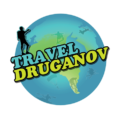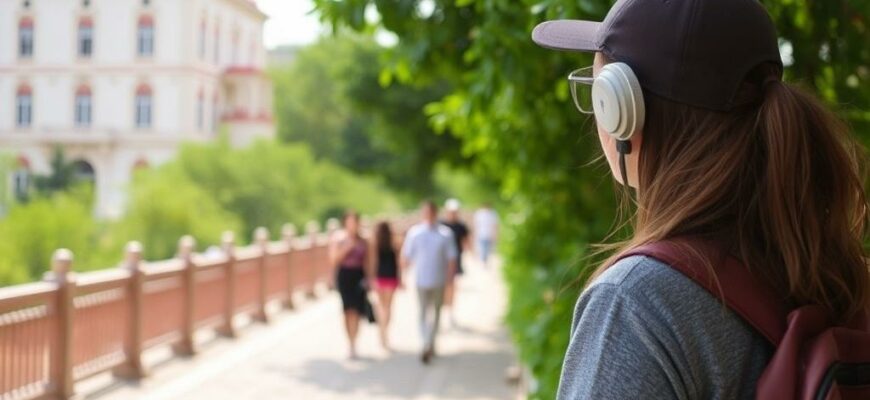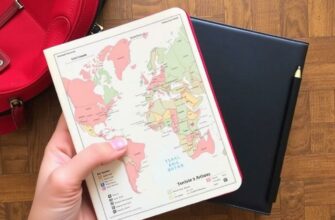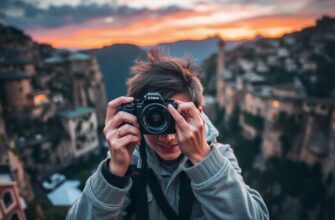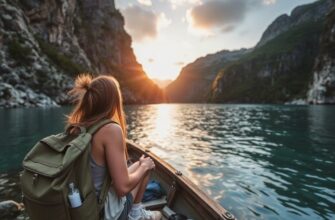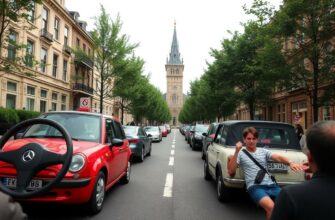Traveling alone can be one of the most rewarding ways to discover the world. It forces you to rely on yourself, meet new people, and design an itinerary that truly reflects your interests. But with freedom comes responsibility: Seguridad para el viajero independiente: Precauciones esenciales is not just a slogan — it’s a mindset that keeps your trip joyful, secure, and stress-free. In this article I’ll walk you through everything you need to think about before you leave, while you’re on the move, and in the unexpected moments that test your preparedness. Whether you are a first-time independent traveler or a seasoned solo explorer, these practical tips will help you travel smarter and safer.
Travel safety isn’t about paranoia; it’s about preparation. The small habits you adopt — from where you stash your money to the way you share your itinerary — can make a big difference. We’ll cover planning and research, document and money security, health and medical considerations, staying safe at your accommodations and on transport, technology and data safety, cultural awareness, and how to handle emergencies. You’ll also find helpful checklists and a simple safety table that you can save or print before your next trip.
By the end of this piece you should feel equipped with actionable steps you can take right now to improve your seguridad para el viajero independiente. These are practical, real-world precautions that have helped many solo travelers avoid trouble and focus on the joy of exploration.
Start with Research: The Foundation of Precautions
Good safety starts long before you pack your bags. Research is the first and most powerful precaution. Learn about the destinations you plan to visit: their political climate, crime rates, typical scams, local customs, and the geography of neighborhoods. Look beyond glossy travel blogs; government travel advisories, reputable travel forums, and recent travel reports offer up-to-date warnings and practical tips.
When researching, pay attention to:
- Government travel advisories and vaccination recommendations.
- Neighborhoods to avoid at night and areas with high tourist scams.
- Local transportation reliability and safety (e.g., official taxis vs. unregulated cabs).
- Typical opening hours, cultural norms, and dress expectations.
Book your first and last nights in advance, especially if you arrive late or leave early. Knowing you have a safe place to land reduces anxiety and reduces mistakes that can occur when you’re tired and disoriented.
Use Multiple, Reliable Sources
Rely on a variety of sources — government advisories, travel forums, local expatriate Facebook groups, hotel reviews, and travel insurance company tips. Cross-referencing helps you avoid one-off stories that may not reflect current conditions. Also, seek recent firsthand accounts from travelers who arrived in the last few weeks, because situations can change quickly.
Documents and Identification: Carry, Copy, and Secure
Losing your passport or important documents can derail a trip. For seguridad para el viajero independiente, treat your paperwork like a valuable asset. Carry only what you need and keep backups.
Practical steps:
- Carry your passport when required, but leave the original in a hotel safe for low-risk outings when possible.
- Make digital copies of your passport, visa, driver’s license, and insurance documents; store these in secure cloud storage and on an encrypted USB or password-protected device.
- Carry a photocopy of key documents separated from the originals.
- Register with your embassy or consulate if a service exists — it helps in emergencies.
If you’re traveling through multiple countries, keep documents organized in a travel wallet that’s easy to access yet secure. Use RFID-blocking sleeves only if you carry RFID-enabled cards and are concerned about electronic skimming.
Cards, Cash, and Currency Safety
A mix of cash, credit cards, and debit cards is best. Don’t carry all your money in one place. For seguridad para el viajero independiente, split funds between a money belt, a hidden pocket, and a locked luggage compartment.
Practical money management:
- Notify your bank and card providers of travel dates and destinations to avoid blocked transactions.
- Consider a travel credit card with low foreign transaction fees and travel protections.
- Keep small amounts of local currency for immediate expenses; withdraw larger sums from ATMs in safe, well-lit places (preferably inside banks).
- Have a backup card stored separately in case of loss or skimming.
Health and Medical Preparedness
Nothing ruins a trip like a preventable illness. Prioritize health precautions before and during travel.
Pre-trip health steps:
- Visit a travel clinic 4–8 weeks before departure for vaccinations, prescriptions, and destination-specific advice.
- Pack a small medical kit: basic first aid, antiseptic wipes, common medications (pain relief, anti-diarrheal, antihistamines), and any prescription medicine in original labeled containers.
- Bring a doctor’s note for controlled medications and prescriptions in case of customs checks.
- Purchase comprehensive travel health insurance that includes evacuation and emergency dental care.
When you’re on the road, stay hydrated, get enough rest, and follow local food safety tips. If you’re traveling to remote areas, know the locations of nearby clinics and how to contact emergency services.
Mental Health and Solo Travel
Traveling alone can be emotionally intense. Practice self-care, stay in touch with friends or family, and be honest about your limits. If you feel overwhelmed, take a low-stress day exploring a park, reading in a café, or treating yourself to a familiar meal. Mental well-being is a critical part of seguridad para el viajero independiente.
Accommodation Safety: Choosing and Using Lodging Wisely

Where you sleep matters. When choosing accommodation, prioritize safety, location, and reviews from other solo travelers.
What to look for:
- Positive reviews mentioning cleanliness, safety, and responsive staff.
- Good lighting and secure entry systems (keycards, staffed reception, CCTV).
- Proximity to public transport and central neighborhoods — avoid extremely isolated places.
On arrival:
- Check that all locks and windows work, and use the deadbolt or chain at night.
- Don’t advertise that you’re traveling alone or your arrival/departure plans to strangers.
- Keep valuables in a room safe or locked luggage; consider a portable travel safe for extra security.
- Be cautious when sharing your room number or exact location publicly or on social media.
Short-term Rentals and Hostels
Short-term rentals and hostels are popular among independent travelers but require specific precautions. Read host/hostel rules, check safety features, and verify the host’s identity and reviews. In multi-bed hostels, use lockers and consider earplugs and a sleep mask for better rest. If possible, choose female-only dorms or private rooms for added comfort.
Transport Safety: Getting Around with Confidence
Transport presents daily safety choices. Whether taking public transit, trains, buses, or taxis, knowing how to choose safely will reduce risk.
Key tips:
- Use official taxis or reputable ride-hailing services where available. Avoid unmarked cars.
- If taking night buses or trains, keep your bags secured and choose seats near staff or other passengers.
- On public transit, stay aware of your surroundings and hold bags in front of you, especially in crowded areas.
- If renting a vehicle, understand local driving laws and insurance requirements; never leave valuables visible in a parked car.
When using ride-hailing apps, confirm the license plate and driver details before entering, share your trip with a contact, and use the app’s safety features if available.
Walking at Night and Solo Excursions
Walking is often the best way to experience a city, but use common sense at night. Stick to well-lit, populated streets, avoid shortcuts through parks or alleys, and trust your instincts. If an area feels unsafe, head to a busy café, hotel lobby, or gas station until you can arrange safer transport.
Technology and Data Protection
Your devices hold a lot of personal data. For seguridad para el viajero independiente, protect both your physical gadgets and the data inside them.
Device hygiene:
- Use strong, unique passwords and enable two-factor authentication on key accounts (email, banking, travel apps).
- Keep devices updated with the latest operating system and security patches.
- Install a reputable VPN for public Wi-Fi use; avoid logging into critical accounts over unsecured networks.
- Use a privacy screen in crowded areas and lock your phone with biometric or PIN security.
Backing up data to cloud services or encrypted drives protects you in case of theft. Also, consider travel-friendly compact chargers and portable battery packs so you’re never left with a dead phone in an emergency.
Avoiding Scams and Over-sharing
Digital and in-person scams often target outsiders. Don’t overshare your itinerary, accommodation details, or personal plans on public forums or social media. Verify unsolicited help or offers (e.g., tickets, tours) through official channels, and be wary of overly friendly strangers who seem too eager to assist — particularly if they ask you to move to a quieter place.
Local Laws, Customs, and Respectful Behavior
Ignorance of local laws is rarely a valid defense. Before you travel, learn basic legal and cultural norms: acceptable dress, alcohol rules, drug laws, photography restrictions, and appropriate behavior in religious sites.
Respectful behavior:
- Research dress codes for religious sites and public spaces and adhere to them.
- Learn a few polite phrases in the local language — a small effort goes a long way in showing respect.
- Observe public displays of affection norms and gender-specific expectations.
When in doubt, follow the lead of locals or ask politely. Observant, respectful travelers are less likely to become targets of harassment or scrutiny.
Personal Safety Habits and Street Smart Behaviors
Independent travelers develop a set of daily habits that significantly reduce risk. These are small, repeatable practices that quickly become automatic.
Essential habits:
- Keep a low profile — avoid flashy jewelry and expensive gadgets visible in the street.
- Use a crossbody bag worn in front or a money belt for passports and cash.
- Break large bills in safe places (hotels, banks) and carry small change for street purchases.
- Be cautious when accepting food or drinks from strangers; never leave your drink unattended in social settings.
Practice situational awareness: look confident, keep your head up, and avoid appearing lost or overwhelmed when carrying expensive cameras or maps. If someone tries to distract you, that could be a sign of a pickpocketing technique — step away into a busy area and secure your belongings.
Dealing with Harassment and Threats
Sadly, harassment can occur anywhere. Prepare a plan:
- Have a few pre-planned responses — polite refusals, walking away, or loudly asking for help can be effective.
- Identify safe spots nearby (shop, hotel, restaurant) where you can go if you feel threatened.
- Consider carrying a small personal alarm or whistle to draw attention in an emergency.
- If physically threatened, prioritize escape and contact local authorities and your embassy if necessary.
If harassment escalates, find witnesses and document the incident (photos, names of nearby people) to assist authorities.
Special Considerations: Women, LGBTQ+, and Vulnerable Travelers
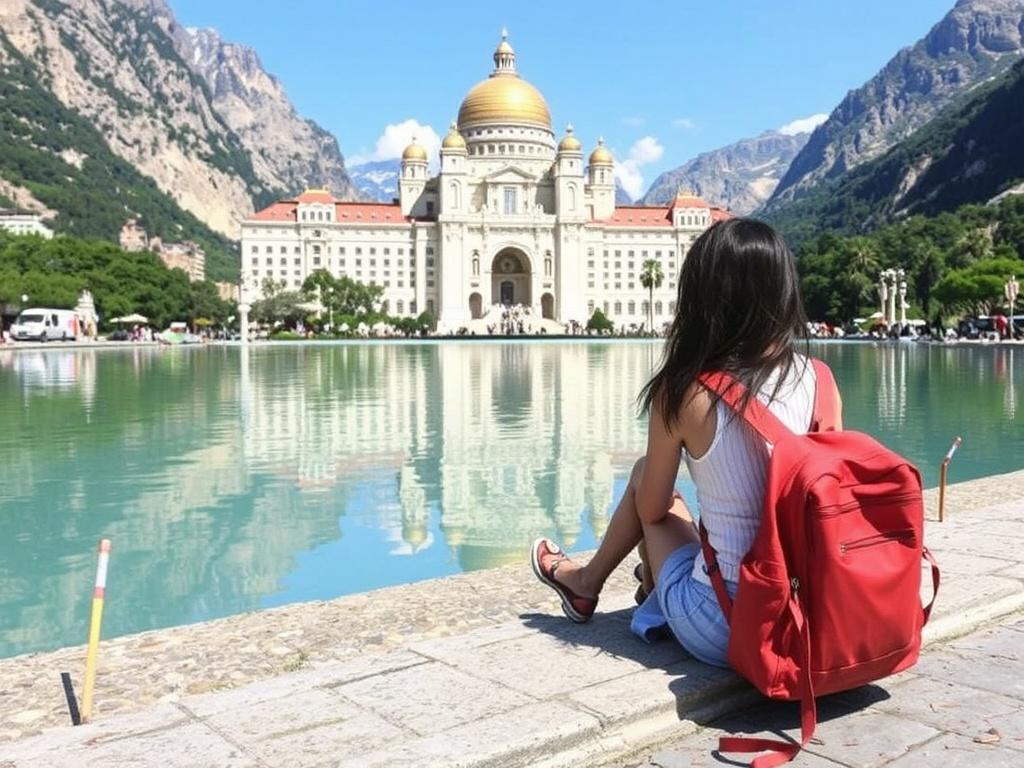
Certain groups may face unique risks or cultural challenges. Tailor seguridad para el viajero independiente to your specific needs.
For women solo travelers:
- Research safety of destinations for women traveling alone and look for women-specific travel advice and communities.
- Consider accommodations that provide added privacy and security.
- Dress to blend in and respect local customs relating to gender norms to reduce unwanted attention.
For LGBTQ+ travelers:
- Understand the legal and social climate for LGBTQ+ people at your destinations; some places may have restrictive laws.
- Avoid public displays of affection in places where it could attract hostility or legal trouble.
- Use LGBTQ+ travel guides and local community resources for safe venue recommendations and emergency contacts.
For travelers with disabilities or health needs:
- Confirm accessibility of transport and lodging beforehand and carry necessary medical supplies and instructions.
- Check local health services and how to access emergency care if needed.
Emergency Planning: Know What to Do When Things Go Wrong
Emergencies happen even to the most prepared travelers. A clear plan reduces panic and improves outcomes.
Emergency checklist:
- Program emergency numbers into your phone and memorise a trusted contact back home.
- Know your embassy or consulate address and hours and how to contact them — register with them if possible.
- Carry emergency cash and a backup SIM or way to access important numbers if your phone is lost.
- Understand your travel insurance claim process and keep digital copies of your policy and receipt of purchase.
If you lose your passport, contact local police and your embassy immediately. If you’re in a medical emergency, seek local emergency services and notify your insurance provider as soon as possible to coordinate care and potential evacuation.
Simple Emergency Phrases and Actions
Learn a few key local phrases: “Help,” “Call the police,” “I need a doctor,” and “I am lost” can be invaluable if you’re panicked. Keep a paper with your hotel address, your embassy info, and emergency contacts in both English and the local language.
Packing Smart: Safety Items to Include
A thoughtful packing list supports seguridad para el viajero independiente. Beyond clothes and toiletries, include items that increase safety and comfort.
Recommended items:
| Item | Purpose |
|---|---|
| Money belt or hidden pouch | Secure storage for passport and cash |
| Portable charger / power bank | Keep phone charged for navigation and emergencies |
| Small flashlight or headlamp | Useful in power outages or poorly lit streets |
| Compact first-aid kit | Immediate care for minor injuries or illnesses |
| Copy of important documents | Backup in case of loss or theft |
| Lock (luggage or portable safe) | Secure your belongings in hostels or shared spaces |
| Personal alarm or whistle | Attract attention in threatening situations |
These items are lightweight and inexpensive, but their utility in an emergency is disproportionate to their cost.
Daily Routines That Improve Safety
Incorporating a few routine habits into your daily travel life dramatically improves seguridad para el viajero independiente.
Daily routine examples:
- Check the day’s itinerary and share your plan with someone back home.
- Carry a small amount of local currency and keep emergency cash hidden.
- Charge devices fully each morning and carry a power bank for long days.
- Update a digital checklist with important addresses and contacts.
- Scan surroundings for exits, transport options, and safe places to retreat.
These little practices build resilience and reduce the likelihood of panic in unfamiliar situations.
Useful Resources and Apps for the Independent Traveler
Technology can be a great ally for seguridad para el viajero independiente. Here are a few categories of apps and resources to consider:
- Maps and navigation: offline map apps and public transit tools.
- Communication: messaging apps that work on limited bandwidth.
- Translation: phrasebook and instant translation apps for quick communication.
- Safety: apps that share live location with trusted contacts and provide emergency services contacts.
- Health and insurance: apps that store policy details and provide medical assistance directories.
Always download and test apps before you travel. Offline functionality is essential when you lack a reliable internet connection.
Practical Scenarios and What to Do
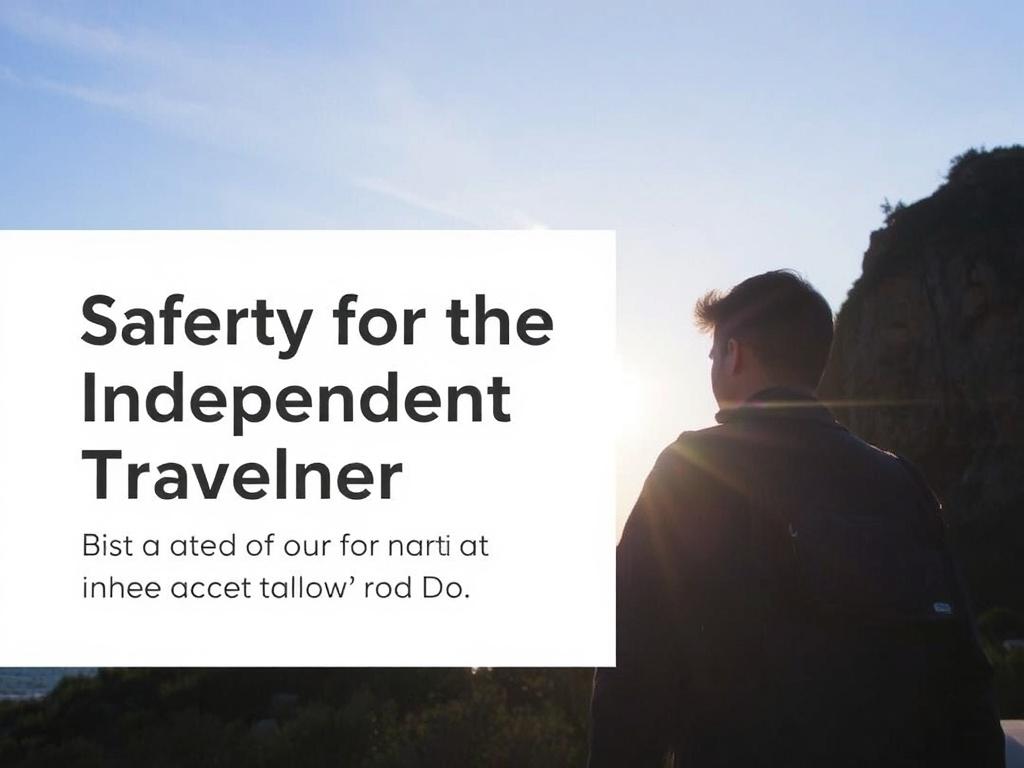
It helps to rehearse likely scenarios so you’re not making decisions under stress. Here are common situations and simple responses.
Scenario: You’re pickpocketed in a crowded market.
- Stay calm and move to a crowded, well-lit area.
- Check your belongings and cancel cards immediately.
- Report to local police for an incident report — required for insurance claims.
- Use copies of your documents to contact the embassy if your passport was stolen.
Scenario: You feel unsafe walking alone at night.
- Find a busy place (shop, café) and ask staff to call a taxi or ride service.
- Use a ridesharing service rather than waiting alone on the street if possible.
- If someone follows you, cross the street, head to a populated place and call for help.
Scenario: Sudden medical emergency.
- Call local emergency services and, if needed, request help from the hotel or locals to translate.
- Contact your insurer to understand next steps and coverage.
- If hospitalized, keep contact with your embassy if you need assistance with arrangements or repatriation.
Mindset: Confidence, Curiosity, and Caution
The final ingredient in seguridad para el viajero independiente is the right mindset. Confidence and curiosity make travel enjoyable; caution keeps you safe. Balance welcoming interactions with thoughtful skepticism. Be curious about new experiences but cautious about unsolicited offers. Learn to read people and situations; when something feels off, remove yourself.
The goal is not to restrict your travel, but to expand it responsibly. Being prepared helps you focus on experiences, people, and places rather than worrying about what could go wrong.
Conclusion
Traveling independently is empowering, and with a few essential precautions you can keep adventures safe and smooth: research thoroughly, secure documents and money, protect your health, choose safe accommodations, use sound transport practices, safeguard your devices and data, respect local laws and customs, and prepare for emergencies. Adopt simple daily routines, carry a few smart items, and maintain a balanced mindset of confidence and caution. Seguridad para el viajero independiente: Precauciones esenciales is a practical approach that doesn’t limit your freedom — it enhances it, allowing you to enjoy the world with greater peace of mind and a stronger sense of control.
